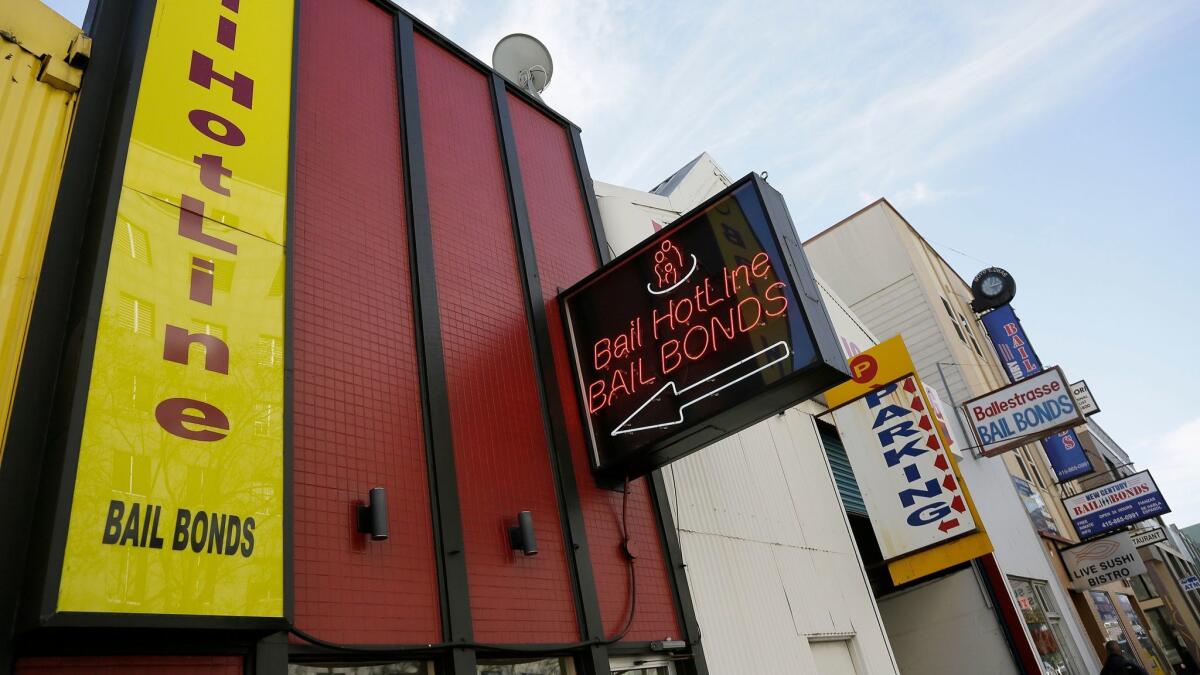Op-Ed: He stole $5 and a bottle of cologne. His bail was set at $350,000

The case of a San Francisco senior citizen accused of stealing $5 and a bottle of cologne from his neighbor reveals the obvious injustice of California’s bail system, and may finally lead to reform.
Kenneth Humphrey has languished in San Francisco County Jail for more than 250 days on $350,000 bail. His charges include robbery and residential burglary for allegedly stepping into his neighbor’s room in their senior housing complex.
San Francisco is ground zero for the state’s battle over bail.
But in late January, a panel of state appeal court judges ordered a new bail hearing for the retired shipyard laborer. The panel also stated that the laws governing bail are the “antithesis” of what the Constitution requires before a person may be deprived of liberty.
“A defendant may not be imprisoned solely due to poverty,” the court said, a revolutionary decision, if it’s upheld.
San Francisco is ground zero for the state’s battle over bail. Since October, the city’s public defenders have challenged bail amounts in virtually every criminal case, demanding that judges hold hearings to consider alternatives to incarceration and inquiries into their clients’ financial circumstances.
They have found a sympathetic audience in the state’s appellate court judges, who have ruled that only an immediate threat to the public justifies setting unreachable bail amounts.
Prosecutors and judges at the local level, however, continue to undermine these appellate decisions by exaggerating perceived public safety risk.
Humphrey’s case is extreme in the sense that a $5 crime led to a several hundred thousand dollar bail, and even the district attorney concedes he poses no threat to society. But every day in every county criminal courthouse in California, prosecutors request sky-high bail amounts from judges who are happy to impose them. That makes a mockery of the presumption of innocence and equality before the law, as poor people accused of minor offenses wait in jail while wealthy people go free despite the seriousness of their charges.
Money bail as it’s currently constituted punishes poverty, and too often results in coerced guilty pleas from those who can’t get out of jail any other way.
How did we get here?
Humphrey’s incarceration is not an aberration or an accident; “it stems instead from the unwillingness of our society, including the courts,” the San Francisco panel wrote, “to correct a deformity in our criminal justice system that close observers have long considered a blight.”
That “blight” persists in part because of the for-profit bail industry and its powerful lobby. The published opinion includes a devastating critique of arbitrary bail schedules, casts doubts on the increased reliance on “opaque” algorithmic risk assessment tools, articulates the staggering costs of pretrial incarceration, and holds that the government must present “clear and convincing” evidence of immitigable risk in order to detain someone before trial.
In Humphrey’s case, as in so many, “the prosecutor presented no evidence that non-monetary conditions of release could not sufficiently protect” public interests.
The law, rooted in precedent, is often slow to correct itself. And while the appellate court decision put a crack in the foundation of the bail system, it’s up to the legislature to come up with something new.
“Legislation is desperately needed,” the appeal panel wrote.
As it happens, legislation is at hand: Senate Bill 10, which would effectively outlaw money bail, passed the state Senate and is now being held in committee in the Assembly. It just needs a handful more votes and the governor’s agreement to become law.
Humphrey is one of many people behind bars simply because he’s poor, but he could be among the last.
Jeff Adachi is the San Francisco Public Defender. Chesa Boudin is a Deputy Public Defender in San Francisco and on the board of the Civil Rights Corps, which challenges money bail across the country.
Follow the Opinion section on Twitter @latimesopinion or Facebook
More to Read
A cure for the common opinion
Get thought-provoking perspectives with our weekly newsletter.
You may occasionally receive promotional content from the Los Angeles Times.










